新编英语教程 6 Unit 12 教案
新编英语教程(第三版)第一册第六课课件
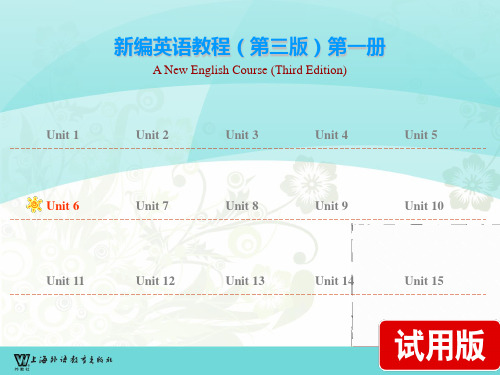
If two call you a donkey, check for hoof prints. If three call
us.
新编英语教程(第三版)第一册
Unit 6 Save Our Pandas Lead-In LSP Dialogue Role Play Reading Exercises
gross: (infml) very unpleasant to look at or think about e.g.: Ooh, gross! I hate spinach!
wet my fur: urinate on my fur 尿湿身上
新编英语教程(第三版)第一册
Unit 6 Save Our Pandas Lead-In LSP Dialogue Role Play Reading Exercises
humiliation: a feeling of shame and great embarrassment, because you have been made to look stupid or weak 羞辱 e.g.: She faced the humiliation of discussing her husband’s
新编英语教程(第三版)第一册
A New English Course (Third Edit 3
Unit 4
Unit 5
Unit 6
Unit 7
Unit 8
Unit 9
Unit 10
Unit 11
Unit 12
Unit 13
Unit 14
Unit 15
Unit 6 Save Our Pandas Lead-In LSP Dialogue Role Play Reading Exercises
新编英语教程UNIT 1,12
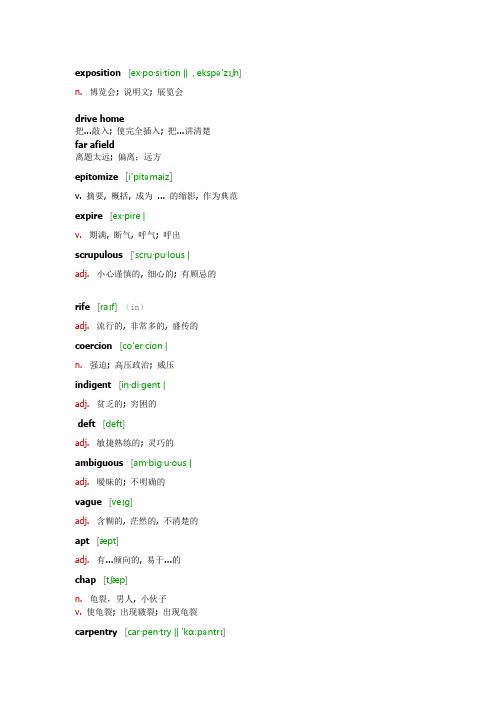
exposition[ex·po·si·tion || ‚ekspə'zɪʃn] n.博览会; 说明文; 展览会drive home把...敲入; 使完全插入; 把...讲清楚far afield离题太远; 偏离;远方epitomize [i'pitəmaiz]v. 摘要, 概括, 成为 ... 的缩影, 作为典范expire[ex·pire |v.期满, 断气, 呼气; 呼出scrupulous['scru·pu·lous |adj.小心谨慎的, 细心的; 有顾忌的rife[raɪf] (in)adj.流行的, 非常多的, 盛传的coercion[co'er·cion |n.强迫; 高压政治; 威压indigent[in·di·gent |adj.贫乏的; 穷困的deft[deft]adj.敏捷熟练的; 灵巧的ambiguous[am·big·u·ous |adj.暧昧的; 不明确的vague[veɪg]adj.含糊的, 茫然的, 不清楚的apt[æpt]adj.有...倾向的, 易于...的chap[tʃæp]n.龟裂,男人, 小伙子v.使龟裂; 出现皲裂; 出现龟裂carpentry[car·pen·try || 'kɑːpəntrɪ]n.木匠业; 木作品; 木工substitute[sub·sti·tute |v.代替; 替代, 取代n.代理, 代用品, 代理人opportunism[op·por·tun·ism |n.机会主义, 投机主义singularity[sin·gu·lar·i·ty |n.单一; 奇异; 异常malapropism[mal·a·prop·ism |n.词语误用; 用词错误可笑oddity[odd·i·ty |n.奇异, 奇特, 奇妙peculiarity[pe·cu·li·ar·i·ty |n.特质, 怪癖, 特性put in one’s place +sth 代之以…distillation[dis·til·la·tion |n.蒸馏; 蒸馏物; 净化; 精华distill 蒸馏;滴下;提取精华be alive to: realizealteration[al·ter·a·tion |n.变更, 改变, 修改; 变样delicate['del·icate |adj.细致优雅的, 美味的, 微妙的have some/no kinship with…有有血族关系ellipsis[el'lip·sis |n.省略; 省略符号shades of meaning/opinion有细微差别的意思/意见prolific[pro'lif·ic |adj.生子的, 多产的, 结果实的amateur[am·a·teur |n.业余从事者; 粗通的人; 外行; 爱好者adj.业余的; 外行的, 不熟练的detach[de·tach |v.分开; 分遣; 分离euphoric[eu'phor·ic |adj.心情愉快的; 心满意足的schizophrenic[schiz·o·phren·ic |n.精神分裂症患者adj.精神分裂症的dreadful['dread·ful |adj.可怕的prune[pruːn]n.梅干; 傻瓜; 乏味的人, 讨厌的人; 深紫红色v.整枝; 减少; 删除; 修剪, 修整; 删除; 剪去, 剪除; 削减constructivelyadv.建设性地spontaneity[spon·ta·ne·i·ty |n.自发性; 自然发生craftman 工匠师傅virtuous[vir·tu·ous |adj.善良的, 贞洁的, 有道德的simultaneous[si·mul·ta·ne·ous |adj.同时的, 同时发生的sequence[se·quence |n.序列, 顺序, 继起的事construct[con·struct |n.构思的结果, 构想; 概念v.建造; 创立; 构造vehicle[ve·hi·cle |n.交通工具, 传达媒介, 车辆genre[gen·re |n.类型; 流派dimension[di·men·sion |n.尺寸, 容积, 次元immense[im·mense |adj.极广大的; 非常好的; 无边的tedious[te·di·ous |adj.冗长乏味的; 使人厌烦的triple[tri·ple |v.使成三倍, 三倍于; 增至三倍adj.三倍的; 由三部分构成的; 三重的; 三方的quadruple['quad·ru·ple || 'kwɑdruːpl /'kwɒd-] n.四倍数v.使成四倍; 成为四倍adj.四倍的, 四部组成的, 四重的denotation[de·no·ta·tion |n.指示;外延意义;外延;字面意思unit 12anthropology[an·thro·pol·o·gy |n.人类学mating[mat·ing |n.交配; 婚姻; 相配mate[meɪt]n.同伴, 伙伴; 配偶; 老兄, 老弟; 动物的配偶v.使交配; 使配对; 成伙伴; 紧密配合, 交配gamut[gam·ut |n.全音阶; 全音域; 长音阶evolve[e·volve |v.使发展, 使进化, 推论; 进展, 展开, 进化aberrant[æbərənt]adj.脱离正道的, 变体的, 脱离常轨的manifest[man·i·fest |n.载货单; 旅客名单v.表明, 证明, 表现adj.显然的; 明白的probe[prəʊb]n.探针, 探测针, 调查v.用探针测, 详细调查; 探测; 调查; 查究philosophical probings 哲学探索pristine[pris·tine |adj.原来的, 原始的, 古时的vernacular[ver·nac·u·lar |n.本地话, 方言adj.地方的, 用地方语写成的autonomous[au·ton·o·mous |adj.自治的; 自主的; 自治权的; 独立存在的autonomouslyadv.自治地; 独立自主地incumbent[in'cum·bent |n.现任者, 在职者; 领圣俸者; 教区牧师adj.凭依的, 负有义务的, 依靠的preliminary[pre·lim·i·nar·y |adj.初步的, 预备的, 开始的cactus[cac·tus | --cacti (pl.)n.仙人掌nebula(e)[neb·u·la |n.星云, 云翳variant['var·i·ant |n.变体, 异体primitive[prim·i·tive |n.原始人, 早期艺术家adj.原始的, 旧式的, 上古的barbarian[bar·bar·i·an |n.粗鲁无礼的人; 野蛮人adj.野蛮的; 粗鲁的pagan[pa·gan |n.异教徒, 无宗教信仰者adj.异教的; 不信教的; 非基督教的sway[sweɪ]n.摇动, 摇摆; 统治; 支配; 影响v.摇摆; 动摇;倾斜; 转向; 影响sophistication[so·phis·ti·ca·tion | n.老于世故; 复杂; 有教养; 精密。
新编英语教程6下课文(ANEWENGLISHCOURSE6:Unit9-12TextI)

Unit Nine Text I A Red Light for Scofflaws Frank Trippettw-and-order is the longest-running and probably the best-loved political issue in U.S. history. Y et it is painfully apparent that millions of Americans who would never think of themselves as lawbreakers, let alone criminals, are taking increasing liberties with the legal codes that are designed to protect and nourish their society. Indeed, there are moments today—amid outlaw litter, tax cheating, illicit noise and motorized anarchy—when it seems as though the scofflaw represents the wave of the future. Harvard Sociologist David Riesman suspects that a majority of Americans have blithely taken to committing supposedly minor derelictions as a matter of course. Already, Riesman says, the ethic of U.S. society is in danger of becoming this: "Y ou're a fool if you obey the rules."2.Nothing could be more obvious than the evidence supporting Riesman. Scofflaws abound in amazing variety. The graffiti-prone turn public surfaces into visual rubbish. Bicyclists often ride as though two-wheeled vehicles are exempt from all traffic laws. Litterbugs convert their communities into trash dumps. Widespread flurries of ordinances have failed to clear public places of high-decibel portable radios, just as earlier laws failed to wipe out the beer-soaked hooliganism that plagues many parks. Tobacco addicts remain hopelessly blind to signs that say NO SMOKING. Respectably dressed pot smokers no longer bother to duck out of public sight to pass around a joint. The flagrant use of cocaine is a festering scandal in middle-and upper-class life. And then there are (hello, Everybody!) the jaywalkers.3.The dangers of scofflawry vary wildly. The person who illegally spits on the sidewalk remains disgusting, but clearly poses less risk to others than the company that illegally buries hazardous chemical waste in an unauthorized location. The fare beater on the subway presents less threat to life than the landlord who ignores fire safety statutes. The most immediately and measurably dangerous scofflawry, however, also happens to be the most visible. The culprit is the American driver, whose lawless activities today add up to a colossal public nuisance. The hazards range from routine double parking that jams city streets to the drunk driving that kills some 25,000 people and injures at least 650,000 others yearly. Illegal speeding on open highways? New surveys show that on some interstate highways 83% of all drivers are currently ignoring the federal 55 m.p.h. speed limit.4.The most flagrant scofflaw of them all is the red-light runner. The flouting of stop signals has got so bad in Boston that residents tell an anecdote about a cabby who insists that red lights are "just for decoration." The power of the stoplight to control traffic seems to be waning everywhere. In Los Angeles, red-light running has become perhaps the city's most common traffic violation. In New Y ork City, going through an intersection is like Russian roulette. Admits Police Commissioner Robert J. McGuire: "Today it's a 50-50 toss-up as to whether people will stop for a red light." Meanwhile, his own police largely ignore the lawbreaking.5.Red-light running has always been ranked as a minor wrong, and so it may be in individual instances. When the violation becomes habitual, widespread and incessant, however, a great deal more than a traffic management problem is involved. The flouting of basic rules of the road leaves deep dents in the social mood. Innocent drivers and pedestrians pay a repetitious price in frustration, inconvenience and outrage, not to mention a justified sense of mortal peril. The significance of red-light running is magnified by its high visibility. If hypocrisy is the tribute that vice pays to virtue, then furtiveness is the true outlaw's salute to the force of law-and-order. Thered-light runner, however, shows no respect whatever for the social rules, and society cannot help being harmed by any repetitious and brazen display of contempt for the fundamentals of order. 6.The scofflaw spirit is pervasive. It is not really surprising when schools find, as some do, that children frequently enter not knowing some of the basic rules of living together. For all their differences, today's scofflaws are of a piece as a symptom of elementary social demoralization—the loss by individuals of the capacity to govern their own behavior in the interest of others.7.The prospect of the collapse of public manners is not merely a matter of etiquette. Society's first concern will remain major crime (see Cover Story), but a foretaste of the seriousness of incivility is suggested by what has been happening in Houston. Drivers on Houston freeways have been showing an increasing tendency to replace the rules of the road with violent outbreaks. Items from the Houston police department's new statistical category—freeway traffic violence: 1) Driver flashes high-beam lights at car that cut in front of him, whose occupants then hurl a beer can at his windshield, kick out his tail lights, slug him eight stitches' worth. 2) Dump-truck driver annoyed by delay batters trunk of stalled car ahead and its driver with steel bolt. 3) Hurrying driver of 18-wheel truck deliberately rear-ends car whose driver was trying to stay within 55 m.p.h. limit. The Houston Freeway Syndrome has fortunately not spread everywhere. But the question is: Will it?8.Americans are used to thinking that law-and-order is threatened mainly by stereotypical violent crime. When the foundations of U.S. law have actually been shaken, however, it has always been because ordinary law-abiding citizens took to skirting the law. Major instance: Prohibition. Recalls Donald Barr Chidsey in On and Off the Wagon: "Lawbreaking proved to be not painful, not even uncomfortable, but, in a mild and perfectly safe way, exhilarating." People wiped out Prohibition at last not only because of the alcohol issue but because scofflawry was seriously undermining the authority and legitimacy of government. Ironically, today's scofflaw spirit, whatever its undetermined origins, is being encouraged unwittingly by government at many levels. The failure of police to enforce certain laws is only the surface of the problem; they take their mandate from the officials and constituents they serve. Worse, most state legislatures have helped subvert popular compliance with the federal 55 m.p.h. law, some of them by enacting puny fines that trivialize transgressions. On a higher level, the Administration in Washington has dramatized its wish to nullify civil rights laws simply by opposing instead of supporting certain court-ordered desegregation rulings. With considerable justification, environmental groups, in the words of Wilderness magazine, accuse the Administration of "destroying environmental laws by failing to enforce them, or by enforcing them in ways that deliberately encourage noncompliance." Translation: scofflawry at the top.9.The most disquieting thing about the scofflaw spirit is its extreme infectiousness. Only a terminally foolish society would sit still and allow it to spread indefinitely.From: M. A. Miller, pp. 266-269Unit Ten Text I Straight-A Illiteracy James P. Degnan1.Despite all the current fuss and bother about the extraordinary number of ordinary illiterates who overpopulate our schools, small attention has been given to another kind of illiterate, an illiterate whose plight is, in many ways, more important, because he is more influential. This illiterate may, as often as not, be a university president, but he is typically a Ph.D., a successful professor and textbook author. The person to whom I refer is the straight-A illiterate, and the following is written in an attempt to give him equal time with his widely publicized counterpart. Comment on the the effect of the present tense, the parallelism, and name of the student, and other linguistic devices used to highlight the problem of this straight-A illiterate.2.The scene is my office, and I am at work, doing what must be done if one is to assist in the cure of a disease that, over the years, I have come to call straight-A illiteracy. I am interrogating, I am cross-examining, I am prying and probing for the meaning of a student’s paper. The student is a college senior with a straight-A average, an extremely bright, highly articulate student who has just been awarded a coveted fellowship to one of the nation’s outstanding graduate schools. He and I have been at this, have been going over his paper sentence by sentence, word by word, for an hour. “The choice of exogenous variables in relation to multi-colinearity,” I hear myself reading from his pape r, “is contingent upon the derivations of certain multiple correlation coefficients.” I pause to catch my breath. “Now that statement, I address the student --- whom I shall call, allegorically, Mr. Bright —“that statement, Mr. Bright, what on earth does it mean?” Mr. Bright, his brow furrowed, tries mightily. Finally, with both of us combining our linguistic and imaginative re-sources, finally, after what seems another hour, we decode it. We decide exactly what it is that Mr. Bright is trying to say, what he really wants to say, which is: “Supply determines demand.”3.Over the past decade or so, I have known many students like him, many college seniors suffering from Bright’s disease. It attacks the best minds, and gradually destroys the critical faculties, making it impossible for the sufferer to detect gibberish in his own writing or in that of others. During the years of higher education it grows worse, reaching its terminal stage, typically, when its victim receives his Ph.D. Obviously, the victim of Br ight’s disease is no ordinary illiterate. He would never turn in a paper with misspellings or errors in punctuation; he would never use a double negative or the word “irregardless.” Nevertheless, he is illiterate, in the worst way: he is incapable of saying, in writing, simply and clearly, what he means. The ordinary illiterate --- perhaps providentially protected from college and graduate school --- might say: “Them people down at the shop better stock up on what our customers need, or we ain’t gonna be in business long.” Not our man. Taking his cue from years of higher education, years of reading the textbooks and professional journals that are the major sources of his affliction, he writes: “The focus of concentration must rest upon objectives centered around the knowledge of customer areas so that a sophisticated awareness of those areas can serve as an entrepreneurial filter to screen what is relevant from what is irrelevant to future commitments.” For writing such gibberish he is awarded straight As on his papers (both samples quoted above were taken from papers that received As), and the opportunity to move, inexorably, toward his fellowship and eventual Ph.D.4.As I have suggested the major cause of such illiteracy is the stuff --- the textbooks and professional journals --- the straight-A illiterate is forced to read during his years of higher education. He learns to write gibberish by reading it, and by being taught to admire it asprofundity. If he is majoring in sociology, he must grapple with such journals as the American Sociological Review, journals bulging with barbarous jargon, such as “ego-integrative action orientation”and “orientation toward improvement of the gratificational-deprivation balance of the actor” (the latter of which monstrous phr ases represents, to quote Malcolm Cowley, the sociologist’s way of saying “the pleasure principle”). In such journals, Mr. Cowley reminds us, two things are never described as being “alike.” They are “homologous” or “isomorphic. Nor are things simply “different.” They are “allotropic.” In such journals writers never “divide anything.” They “dichotomize” or “bifurcate” things.From: M. A. Miller, pp. 355-358Unit Eleven Text I On Consigning Manuscripts to Floppy Discs and Archives to OblivionWillis E. McNelly1.Manuscripts, those vital records of an author’s creative process, are an endangered species. The advent of word processors, and their relatively low cost together with increasing simplic ity, means that even impoverished, unpublished, would-be write rs’ (as well as the Names who top the best-seller list) have turned to their Wangs, IBMs and Apples, inserted Wordstar, Scriptsit or Apple Writer programs and busily begun writing, editing and revising their creative efforts. The result? A floppy disc!2.We should deplore the disappearance of manuscripts. How can anyone, student or scholar, learn anything about the creative process from a floppy disc? Can this wobbly plastic reveal the hours, the endless hours, where beauty was born out of its own despair (as William Butler Y eats put it) and blear-eyed wisdom out of midnight oil? Manuscripts are these records of creative agony, often sweat-stained, coffee-splattered or cigarette-charred. Manuscripts tell us what went on in a writer’s soul, how he or she fel t during the agony of creation. Edna St.V incent Millay may have burned the candle at both ends and wondered at its lovely light, but her first I drafts are treasures for future generations.3.Imagine if Yeats had written those magnificent lyrics celebrating his futile love for Maud Gonne on a word processor! No floppy disc can possibly reveal the depth of his sorrow. Almost a century later his manuscripts in the National Library in Dublin still glow with the power of his passion. They tell young, wan poets of either sex that faded tearstains are not new, that their feelings, hopes, despairs, loves and losses are actually eternal. Suppose Ray Bradbury had written “Fahrenheit 451” on a Wang. How appropriate, even ironic, it might have been had his various drafts gone the way of the burning books that he deplores and disappeared into a memory bank.4.Fortunately, any student of writing can inspect those same drafts in the Special Collections Library of California State University, Fullerton. Novices and professionals alike can examine how a brief story, “The Fireman,” grew into an unpublished novelette, “Fire Burn, Fire Burn!” and then developed into another longer version, “The Hearth and the Salamander,” also unpublished. The final copy (complete with an occasional typo, since it was typed by the author himself) is available for inspection. On these pages Bradbury’s own bold handwriting has substituted a vivid verb for a flabby one, switched a sentence or two around, sharpened or sometimes eliminated an adjective, substituted a better noun. The manuscript provides a perfect example of the artist at work. We would never see that kind of development or final polishing on any number of floppy discs.5.Moreover, put a lot of manuscripts together and you have an archive. Memoranda, diaries, journals, jottings, first, second and third drafts --- these archives are important to all of us. The archives of a city are often musty collections of scribbled scraps of paper, meaningful doodles about boundary lines or endless handwritten records of marriages, divorces, deeds, births and deaths. Our country’s archives of all kinds are a priceless heritage. The National Archives is jammed with ragged papers, preserved for the scrutiny of historians.6.Manuscripts tell us how Thomas Jef ferson’s mind worked as he drafted the Declaration of Independence. A famous letter to the president of Y ale informs us of Benjamin Franklin’s true feelings about religion. We’ve learned volumes from the diaries, papers, letters and exhortations of those who put our Constitution together. Would we know as much if they had done it all on a newfloppy disc? Unthinkable!7.Similarly, would letters from famous men and women spewed out on a dot-matrix printer have the same fascination as an original holograph? Would a machine-signed, mass-produced letter generated in some White House basement have the same emotional impact --- or the same value, for that matter --- as a handwritten letter mailed by Citizen Ronald Reagan in 1965, complete with hand-addressed envelope and canceled 5-cent stamp? Hardly.8.James Joyce once wrote that the errors of an artist are the portals of discovery. Unfortunately, we’ll never know of those errors if clean, neat, immaculate but errorless floppy discs replace tattered, pen-scratched, scissored, taped, yellowed, rewritten, retyped manuscripts. Libraries preserve them, students learn from them, auctioneers cry them at fabulous prices, owners cherish them. And word processors totally eliminate them. Our loss would be incalculable.9.Manuscripts are our gift to our heritage, and we have no right to deprive future generations of learning how we think and feel, simply because we find word processing more convenient. Patiently corrected manuscripts, not floppy discs, can tell any novice writer or future historian that writing is hard work, that it takes vision and revision alike --- and that it should be done on paper, not with electrons on a screen.From: J. R. McCuen and A. C. Winkler, pp. 512-515Unit Twelve Text I Grant and Lee: A Study in Contrasts Bruce Catton1.When Ulysses S. Grant and Robert E. Lee met in the parlor of a modest house at Appomattox Court House’, V irginia, on April 9, 1865, to work out the terms for the surrender of Lee’s Army of Northern V irginia, a great chapter in American life came to a close, and a great new chapter began.2.These men were bringing the Civil War to its virtual finish. To be sure, other armies had yet to surrender, and for a few days the fugitive Confederate government would struggle desperately and vainly, trying to find some way to go on living now that its chief support was gone. But in effect it was all Over when Grant and Lee signed the papers. And the little room where they wrote out the terms was the scene of one of the poignant, dramatic contrasts in American history.3.They were two strong men, these oddly different generals, and they represented the strengths, of two conflicting currents that, through them, had come into final collision.4.Back ofRobert E. Lee was the notion that the old aristocratic concept might somehow survive and be dominant in American life.5.Lee was tidewater V irginia, and in his background were family, culture, and tradition… the age of chivalry transplanted to a New World which was making its own legends and its own myths. He embodied a way of life that had come down through the age of knighthood and the English country squire. America was a land that was beginning all over again, dedicated to nothing much more complicated than the rather hazy belief that all men had equal rights and should have an equal chance in the world. In such a land Lee stood for the feeling that it was somehow of advantage to human society to have a pronounced inequality in the social structure. There should be a leisure class, backed by ownership of land; in turn, society itself should be keyed to the land as the chief source of wealth and influence. It would bring forth (according to this ideal) a class of men with a strong sense of obligation to the community; men who lived not to gain advantage for themselves, but to meet the solemn obligations which had been laid on them by the very fact that they were privileged. From them the country would get its leadership; to them it could look for the higher values --- of thought, of conduct, of personal deportment --- to give it strength and virtue.6.Lee embodied the noblest elements of this aristocratic ideal. Through him, the landed nobility justified itself. For four years, the Southern states had fought a desperate war to uphold the ideals for which Lee stood. In the end, it almost seemed as if the Confederacy fought for Lee; as if he himself was the Confederacy... the best thing that the way of life for which the Confederacy stood could ever have to offer. He had passed into legend before Appomattox. Thousands of tired, underfed, poorly clothed Confederate soldiers, long since past the simple enthusiasm of the early days of the struggle, somehow considered Lee the symbol of everything for which they had been willing to die. But they could not quite put this feeling into words. If the Lost Cause, sanctified by so much heroism and so many deaths, had a living justification, its justification was General Lee.7.Grant, the son of a tanner on the Western frontier, was everything Lee was not. He had come up the hard way and embodied nothing in particular except the eternal toughness and sinewy fiber of the men who grew up beyond the mountains. He was one of a body of men who owed reverence and obeisance to no one, who were self-reliant to a fault, who cared hardly anything for the past hut who had a sharp eye for the future.8.These frontier men were the precise opposites of the tidewater aristocrats. Back of them, in the great surge that had taken people over the Alleghenies and into the opening Western country, there was a deep, implic it dissatisfaction with a past that had settled into grooves. They stood fordemocracy, not from any reasoned conclusion about the proper ordering of human society, but simply because they had grown up in the middle of democracy and knew how it worked. Their society might have privileges, but they would be privileges each man had won for himself. Forms and patterns meant nothing. No man was born to anything, except perhaps to a chance to show how far he could rise. Life was competition.9.Y et along with this feeling had come a deep sense of belonging to a national community. The Westerner who developed a farm, opened a shop, or set up in business as a trader, could hope to prosper only as his own community prospered --- and his community ran from the Atlantic to the Pacific and from Canada down to Mexico. If the land was settled, with towns and highways and accessible markets, he could better himself. He saw his fate in terms of the nation’s own destiny. As its horizons expanded, so did his. He had, in other words, an acute dollars-and cents-stake in the continued growth and development of his country.10.And that, perhaps, is where the contrast between Grant and Lee becomes most striking. The Virginia aristocrat, inevitably, saw himself in relation to his own region. He lived in a static society which could endure almost anything except change. Instinctively, his first loyalty would go to the locality in which that society existed. He would fight to the limit of endurance to defend it, because in defending it he was defending everything that gave his own life its deepest meaning.11.The Westerner, on the other hand, would fight with an equal tenacity for the broader concept of society. He fought so because everything he lived by was tied to growth, expansion, and a constantly widening horizon. What he lived by would survive or fall with the nation itself. He could not possibly stand by unmoved in the face of an attempt to destroy the Union. He would combat it with everything he had, because he could only see it as an effort to cut the ground out from under his feet.12.So Grant and Lee were in complete contrast, representing two diametrically opposed elements in American life. Grant was the modern man emerging; beyond him, ready to come on the stage, was the great age of steel and machinery, of crowded cities and a restless burgeoning vitality. Lee might have ridden down from the old age of chivalry, lance in hand, silken banner fluttering over his head. Each man was the perfect champion of his cause, drawing both his strengths and his weaknesses from the people he led.13.Y et it was not all contrast, after all. Different as they were — in background, in personality, in underlying aspiration --- these two great soldiers had much in common. Under everything else, they were marvelous fighters. Furthermore, their fighting qualities were really very much alike. 14.Each man had, to begin with, the great virtue of utter tenacity and fidelity. Grant fought his way down the Mississippi V alley in spite of acute personal discouragement and profound military handicaps. Lee hung on in the trenches at Petersburg after hope itself had died. In each man there was an indomitable quality… the born fighter’s refusal to give up as long as he can still remain on his feet and lift his two fists.15.Daring and resourcefulness they had, too; the ability to think faster and move faster than the enemy. These were the qualities which gave Lee the dazzling campaigns of Second Manassas and Chancellorsville and won Vicksburg for Grant.stly, and perhaps greatest of all, there was the ability, at the end, to turn quickly from war to peace once the fighting was over. Out of the way these two men behaved at Appomattox came the possibility of a peace of reconciliation. It was a possibility not wholly realized, in the years to come, but which did, in the end, help the two sections to become one nation again…after a warwhose bitterness might have seemed to make such a reunion wholly impossible. No part of either man’s life became him more than t he part he played in this brief meeting in the McLean house at Appomattox. Their behavior there put all succeeding generations of Americans in their debt. Two great Americans, Grant and Lee --- very different, yet under everything very much alike. Their encounter at Appomattox was one of the great moments of American history.From: K. Flachmann and M. Flachmann, pp. 305-311。
大学一年级新编英语教程unit6
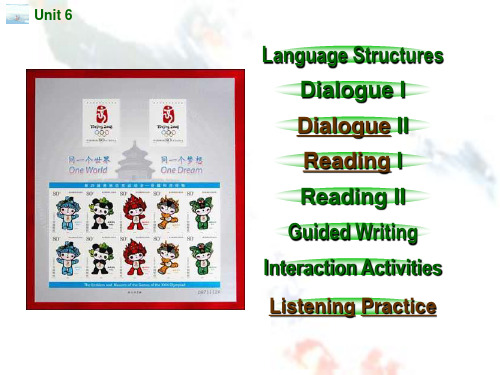
Unit 6
LSP
LS 1 2 3 4
Unit 6
LSP
LS
See the following sentences and find out the grammar rules they use: use: You'll see John when you go to Beijing next week. week. Will you go to see him before you leave? I've been playing the piano since I was a child. child. He won't arrive until four, and I'll wait until he won' arrives. arrives.
作品塑造了仆人史嘉本的形象赞扬他在帮助青年主人反对家长专制斗争中所显示的机智勇敢聪明和乐观表达了作者反对封建等级观念的民主思想
Unit 6
Language Structures Dialogue I Dialogue II Reading I Reading II Guided Writing Interaction Activities
LSP
Unit 6
LSP
3
LSP III Adverbial Clause introduced by "since"
Practice following conversations: Sample 1
A: How long have you been playing the piano? B: (I've been playing the piano) since I was a child. (I' A: How long is it since you play the piano? B: It's ten years (since I began to play the piano). It'
新编英语教程(第三版) Unit 12 练习册答案
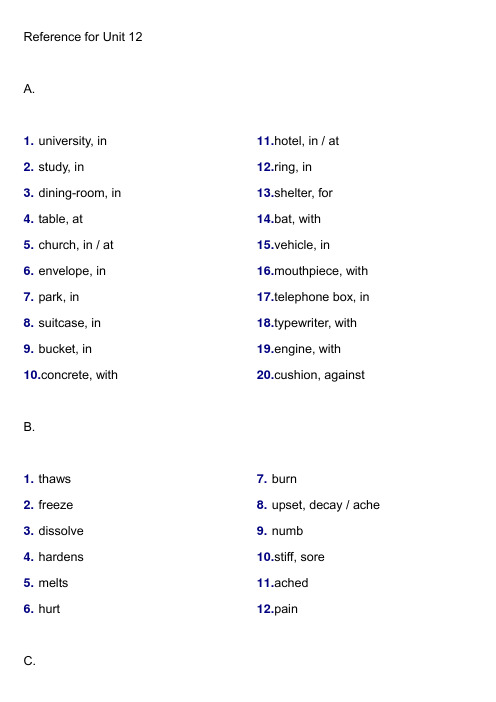
Reference for Unit 12 A.1. university, in2. study, in3. dining-room, in4. table, at5. church, in / at6. envelope, in7. park, in8. suitcase, in9. bucket, in10. c oncrete, with 11. h otel, in / at12. r ing, in13. s helter, for14. b at, with15. v ehicle, in16. m outhpiece, with17. t elephone box, in18. t ypewriter, with19. e ngine, with20. c ushion, againstB.1. thaws2. freeze3. dissolve4. hardens5. melts6. hurt7. burn8. upset, decay / ache9. numb10. s tiff, sore11. a ched12. p ainC.1. have struck2. live3. is … led4. may weigh5. is…recognized6. appears7. is8. spear9. tries10. m ake 11. i s missing12. i s13. i s lost14. w ill…s plit15. j oin16. w ere17. h ave been halved18. h ave reduced19. i s…trying20. a re preparedD.1. D2. B3. C4. D5. A6. D7. A8. C9. A10. D11. C12. B13. A14. B15. CSentence RewritingA.1. The Sunday-school superintendent gave a talk, telling us…eat.2. The boy stood outside the Sunday school, looking round … childre n.3. The old woman sat in the church, listening to … carols.4. The child lay awake all night, waiting for …Claus.5. Marie wrote a letter to her uncle, thanking him … present.6. The girl came into the room, singing and dancing.B.1. The old man sat … chair, his ey es closed.2. Jenny was sitting … desk, the newspaper spread before her.3. Mary having been ill … term, her promotion has to be withheld.4. The fog being dense, no one …streets.5. My mother looked at my father, her face (being) pale and stony.6. There being no proof … guilt, the case was dismissed.7. The agreement signed / having been signed, all of us were satisfied.8. Jane having been caught in the rain, her clothes were wet through.。
新编英语教程I_Unit6
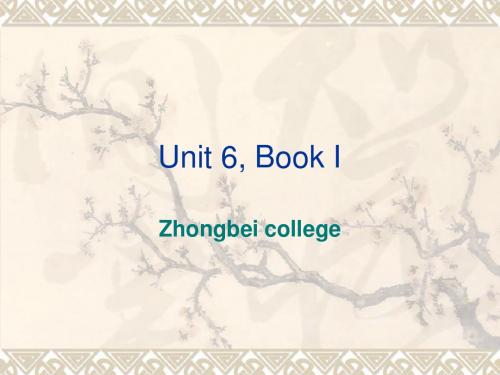
specific questions
1.Is Miss Lu's major acting? Then what is her major? 2.What is The Editorial Board of the Pujiang Weekly is interested in? 3.When she stood on the stage for the first time in her life, how did she feel? 4.When did she begin to act in full-length classical plays? 5.Did she suffer from any degree of stage fright yesterday? 6.How does she view the propects of her amateur acting career when she gradutes from the university?
3. I’ve been playing the piano since I was a child.
1) The verb / verb phrase in the since-clause is usually in the simple past. When the connective is since, the verb/verb phrases in the main clause, when referring to an action, is usually in the present perfect or the present perfect progressive form; when referring to time, however, it is usually in the simple tense.
新编实用英语综合教程1-unit 6-教案

新编实用英语综合教程1-u n i t6-教案
用心整理的精品word文档,下载即可编辑!!
教案首页
精心整理,用心做精品1
用心整理的精品word文档,下载即可编辑!!
课堂组织
教案内容
精心整理,用心做精品2
用心整理的精品word文档,下载即可编辑!!
精心整理,用心做精品3
用心整理的精品word文档,下载即可编辑!!
精心整理,用心做精品4
用心整理的精品word文档,下载即可编辑!!
教案首页
精心整理,用心做精品5
用心整理的精品word文档,下载即可编辑!!
课堂组织
精心整理,用心做精品6
用心整理的精品word文档,下载即可编辑!!
教案内容
精心整理,用心做精品7
用心整理的精品word文档,下载即可编辑!!
精心整理,用心做精品8
用心整理的精品word文档,下载即可编辑!!
精心整理,用心做精品9
教案首页
课堂组织
教案内容
教案首页
课堂组织
教案内容。
李观仪《新编英语教程》学习指南【词汇短语+课文精解+全文翻译+练习答案】-unit10~unit12
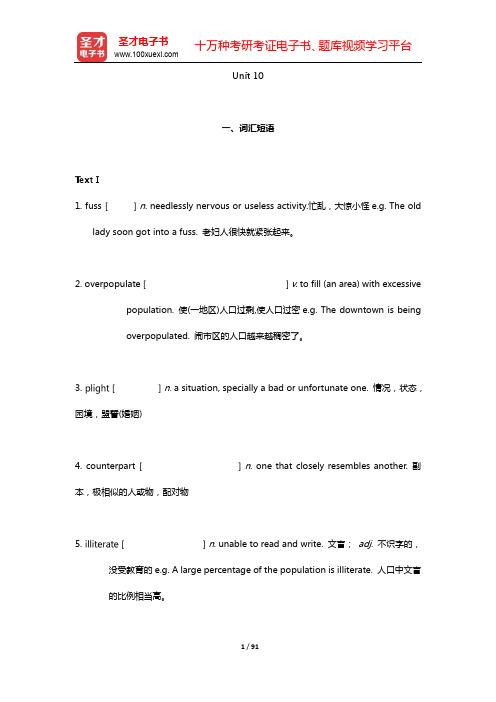
Unit 10一、词汇短语Text I1. fuss n. needlessly nervous or useless activity.忙乱,大惊小怪e.g. The oldlady soon got into a fuss. 老妇人很快就紧张起来。
2. overpopulate v. to fill (an area) with excessivepopulation. 使(一地区)人口过剩,使人口过密e.g. The downtown is beingoverpopulated. 闹市区的人口越来越稠密了。
3. n. a situation, specially a bad or unfortunate one. 情况,状态,困境,盟誓(婚姻)4. counterpart n. one that closely resembles another. 副本,极相似的人或物,配对物5. n. unable to read and write. 文盲;adj. 不识字的,没受教育的e.g. A large percentage of the population is illiterate. 人口中文盲的比例相当高。
6. assist v. to gor supplement. 援助,帮助;通常用作assist sb. in doing sth. 或assist sb. with sth.即“帮助某人做某事”。
7. interrogate v.to examine by questioning formally orofficially. 审问,询问e.g. I interrogated everyone even slightly involved. 我审问了每个人,即便是稍有关联的人也在其中。
8. prying adj. insistently or impertinently curious or inquisitive. 窥视的,窥探的,爱打听的e.g. You are such a prying student. 你真是个爱打听的学生。
- 1、下载文档前请自行甄别文档内容的完整性,平台不提供额外的编辑、内容补充、找答案等附加服务。
- 2、"仅部分预览"的文档,不可在线预览部分如存在完整性等问题,可反馈申请退款(可完整预览的文档不适用该条件!)。
- 3、如文档侵犯您的权益,请联系客服反馈,我们会尽快为您处理(人工客服工作时间:9:00-18:30)。
Unit TwelveTEXT IGRANT AND LEE: A STUDY IN CONTRASTSBruce CattonObjectives: to make a table of all the contrasts and similarities between Grant and Lee and explain them;to analyse the organization of this essay and learn the ways of comparison and contrast;Pre-class work1. Find some brief information about the following persons and events.--- American Civil War--- Ulysses S. Grant--- Robert E. Lee2. Try to answer the questions in Org. & Devl. , and Analysis.3. Identify in the text as many contrasts and similarities between Grant and Lee as you can, and make a table of your own to show all these.Contrasts in family background, in personality, in opinions on privilege, equality, past and future, what to fight for, etc.Similarities as shown in LW 4, but try to explain.Pre-reading Questions1. Tell what you know about American Civil War, Ulysses S. Grant, and Robert E. Lee.(Refer to the attachment copied from Encyclopedia Britanica.)In-reading DiscussionStep 1The usual ways or the basic patterns to organize the comparison and contrast (Analysis)1. Subject-by-subject pattern: A1, A2, A3,...... B1, B2, B3, ......2. Point-by-point pattern: A1, B1; A2, B2; A3, B3; ......3. Subject-by-subject plus point-by-point pattern: combination of 1 & 2. Step 2 Part division (Org.& Devl.)--- Paras. 1-3: Introduction The purpose is to present the two generals for comparison and to put forth the significance of their meeting at Appomattox.--- Paras. 4-12: Contrasts between Grant and Lee.Subject-by-subject comparison (categories compared: background,personality, notions of equality, privilege, past and future, what to fight for, etc.) Paras. 4-6: Lee; 7-8: Grant; 9, 11: Grant; 10: Lee; 12: Summary of the contrasts--- Para. 13: Transition to link the section about the contrasts to the section about the similarities. The transitional word ‘yet’ and the concessional clause prepare the readers for the turn of direction. Their similarities are briefly mentioned in the last two sentences.--- Paras. 14- 16: Similarities between Grant and Lee.Point-by-point comparison (categories compared: tenacity and fidelity, daring and resourcefulness, ability to make peace)Step 3 Contrasts between Grant and Lee in background, in personality, in underlying aspiration (para. 13) including opinions on / notions of privilege, equality, social structure, past and future, what to fight for, etc.(Ask individuals to talk about the contrasts one by one while the teacher makes some necessary explanations of the difficult sentences in the text.)1. tidewater Virginia:(Note 3) a state in the South of America, known at that time for its large plantations and its slaveholding tidewater aristocracy.2. Ohio: (note 8) a part of the Western frontier for those oppressed,discontented, ambitious, and restive people who sought adventures and made fortunes in the West.1. What does the word ‘chivalry’ suggest? (3-1) Or, what are the personality of chivalry, knight, the English country squire?the qualities that knights in the Western countries in the Middle Ages were expected to have, such as courage, honour, courtesy, loyalty, generosity, devotion to the weak and helpless, to the service of women1. pronounced: definite2. There should be a leisured class ... as the chief source of wealth and influence.Society is in need of a class of people who are not job-holders butland-owners, for their land may well help make society rich and powerful.3. Why should the leisured class enjoy privilege? (ll. 25-31)It was this leisured class of wealthy people that supported the society and made the nation powerful. They had a strong obligation to save or help the community instead of gaining advantage for themselves. It was this privileged class that should gain the leadership, decide social values - of thought, of conduct, of personal deportment.4. No man was born to ... how far he could rise.Nobody was born into this world with any rights or privileges; what he might do is to fully utilize every single opportunity with his reach and strive to achieve success.1. What do the words ‘steel and machinery’, ‘crowded cities’ symbolize?And what do the words ‘restless burgeoning vitality’ connote? (3-4) Mechanization, industrialization, and urbanizationDynamism, life, potential of growth and development1. Through him, the landed nobility justified itself.2.He had passed into legend before Appomattox.3. What was Lee’s ideal?a leisured class that had the ownership of wealth, that had all the privileges, that had the obligation to support the nation, to lead the nation in its development, to decide everything including social values.4. What did his men fight for? Why? (ll. 34-41)They fought for the ideals Lee stood for, for him himself. They fought heroically and desperately because they thought they were carrying on a holy cause. They were even willing to die for him because they considered him the Confederacy, the symbol of everything.Their faith in Lee was nearly fanatical, don’t you think so? (3-2)5. Why did Lee fight for his own community / locality?to defend his locality, i.e., all the wealth, the privileges, the power, which are the things that made his life meaningful. (ll. 70-71) So he treasured them and would do everything to preserve them.6. Why did Grant fight for the national community?He believed people could prosper only when their community prospered. He saw his fate in terms of the n ation’s own destiny. (= He had linked his own future with that of his country.) He would become wealthy if his country grew and developed well. (He had an acute dollars-and-cents stake in the continued growth and development of his country.) (para. 9)His living was closely connected with the growth, expansion, and development. He would survive as his country survived; he would fall if his country fell. Therefore, he would take some actions to defend his country when it was in danger. He would fight for his country against the danger with all his might because he thought this danger would bring forth the destruction of the country in which he lived. (He would combat it ... from under his feet.) (para. 11)7. What does ‘it’ in para. 11 refer to? (3-3)An attempt to destroy the nation.Summary:1. Each man was the perfect champion of his cause, drawing both his strengths and his weaknesses from the people he led. (= Each of the two men was the leading figure of his cause, defending his own faith, and each of them was the representative of his class, possessing all the characteristics and qualities - strengths and weaknesses - of his own class.)2. What is the most striking contrast between Grant and Lee according to Catton? What, in your opinion, makes him think so? (3-11)Grant was a nationalist and a democrat while Lee was a regionalist, an aristocrat, and a conservative.Of all their differences, this perhaps was the most essential one, which determined their different notions of the kind of nation America was to be built into.Step 4 Similarities between Grant and Lee1. Refer to LW4, and try to explain by giving synonyms in right column for the words in the left column.2. What is the most important similarity between Grant and Lee? Do you agree with Catton on this? Why? (3-10)to turn quickly from war to peace once the fighting was over. (16)This was the most important similarity because it made possible the reconciliation at Appomattox, which led to the reunification of the North and the South and the creation of the American nation, a most significant event in American history.3. Is the last para. the conclusion? Why did the author conclude the essay in this way? (Org. & Devl. - 3)There is not a separate para. that concludes the essay, but it is properly concluded in the last para., which is supposed to present the last, and also the most important similarity. This has such great significance for the outcome of the encounter at Appomatox that it is hardly possible for Catton to start another para. to restate the historic meaning of this event.Post-reading Activities1. Comp. 1, 22. In this comparison between two historical figures, no mention is made of their physical appearance. Is this a weakness of the essay or is there some justification for avoiding such details? Explain your answer. (3-12) Normally it would be considered a defect. But C. is writing about the two soldiers as large-than-life exeplars of social trends. Also he is writing about their beliefs and deeds rather than about their personal appearance.3. How is the beginning of the essay echoed by the ending? (3-13)What is said in the 1st para. ‘... a great chapter in American life came to a close, and a great new chapter began’ is restated in the last sentence ‘... one ofUnit 12Organization and Development Paras. 1-3IntroductionParas. 4-11Paras. 12Summary of the contrasts Para. 13TransitionParas. 14-16Similarities between Grant and Le (Language Work IV)。
